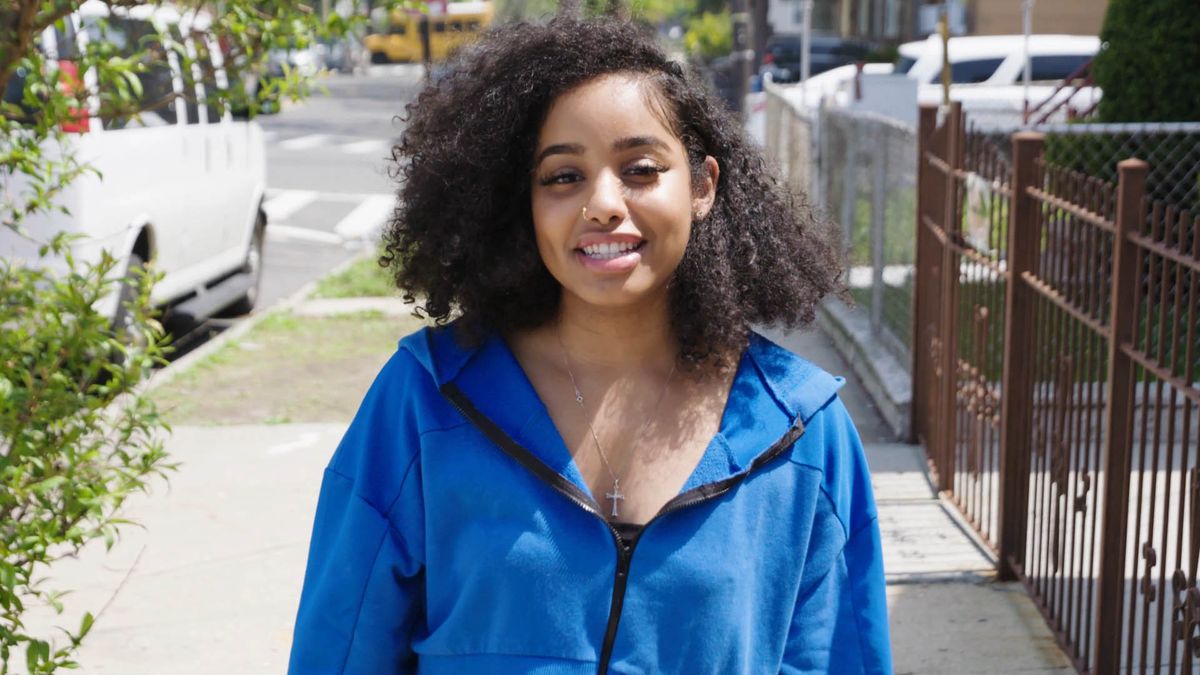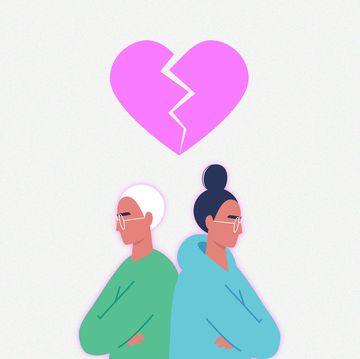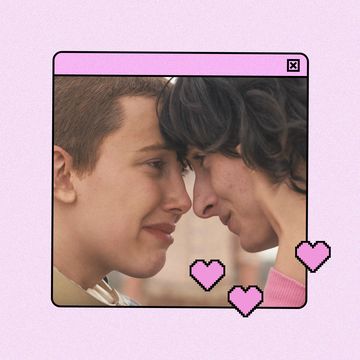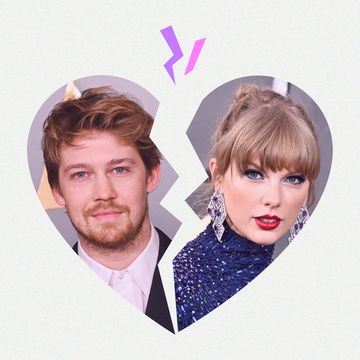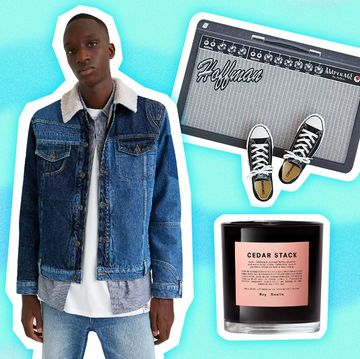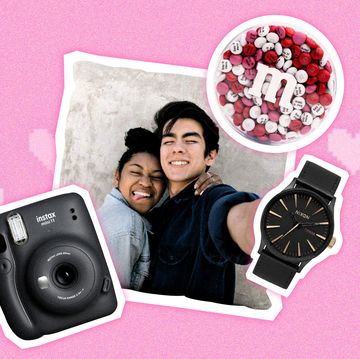Movies and TV shows depict first love to be a complete whirlwind of emotion and a kissing-in-the-rain type of passion that upends your whole world. But is that what love feels like IRL? As you transition from crushing on someone to actually dating them, you might wonder when that deep level of connection is supposed to kick in — you know, the one that signals real love. Well, there’s no set amount of time it takes to fall in love with someone, or a universal sign that indicates that you’ve fallen in love. But there are some specific feelings and emotions that might help you realize that you’re in love.
Romantic love can feel overwhelming, exhilarating, and passionate, but it can be complicated sometimes. It requires trust and vulnerability, and as your connection grows from a flirtation to a first love, it might get a little confusing. If you’re falling hard for someone, here are expert takes on what love feels like and the signs most commonly associated with falling in love.
How long does it take to fall in love?
There’s no set timeline for falling in love but it usually takes at least a few months, Dr. Rebekah Montgomery, licensed clinical psychologist, explains. Sometimes, it can even take years, if, for example, a close friendship turns into love over time. “It depends on the context of meeting and how the relationship with that person unfolds,” Dr. Pauline Yeghnazar Peck, licensed psychologist, adds.
So don’t worry if you don’t feel completely in love with your S.O. after just a couple weeks of dating — it might take some time for that deep connection to develop.
Signs you’re falling in love
Although love is subjective and not every relationship looks exactly the same, there are some common signs that signal true love. Below, the experts weigh in on what being in love feels like.
You feel like the actual heart-eyes emoji
You feel intensely happy when you’re in love. You can’t stop thinking about them, talking about them with your friends, and your heart still goes pitter-patter when their name pops up on your phone screen. “You are excited to see them and are elated when you’re around them,” Dr. Montgomery says.
In fact, love has a *major* effect on the brain. “Scientifically, there is a change in dopamine that shows we are experiencing love,” Natalie Kohlhaas, psychotherapist and author, explains. Dopamine is a feel-good neurotransmitter, according to Harvard Medical School, that plays a role in the “reward system” in your brain. You might even feel the physical effects of love. These include responses like restlessness, sleeplessness, loss of appetite, racing heart, and rapid breathing, Kohlhaas adds.
You picture a future together
“When we begin to think about a future with someone, this is a sign we are falling in love,” Kohlhaas says. Your daydreams go far beyond your summer plans. You think about where you might go to college (and how you might handle the distance if you go to separate schools), your families meeting each other, the city or town you’ll live in post-grad, and maybe even what your wedding day will look like (if that’s your vibe). When you’re in love, you can’t picture a future without them.
You love *all* of the little things about them
You appreciate the little things that make your significant other uniquely them. “Like the funny way one laughs, or a certain expression they have when confused,” Kohlhaas says. “Perceived ‘imperfections’ become endearing.”
Even when you recognize their flaws or generally bothersome traits (like always talking during a movie), you accept them and come to terms with them, rather than be turned off by them. “Healthy secure love tends to be focused on the whole person, not just their good qualities or superficial characteristics,” Dr. Montgomery explains.
It’s so much more than lust
The attraction is there, ofc, but your relationship goes so much deeper than the physical stuff. “Lust can be a part of love,” Dr. Peck clarifies, but your connection grows beyond your sexual feelings. “Love is broader, and encompasses a friendship and companionate component as well,” she says.
“With lust, the emotions are centered around sex,” Kohlhaas adds. But with love, the emotions are centered around, yes, passion and intimacy, but also commitment, trust, respect, companionship, and security.
You prioritize their needs
When you’re in love, you want to be there for your partner. You should never sacrifice your own needs, but you make sure each other’s needs are met and lean on one another for support.
“You care about their own growth and goals,” Dr. Montgomery explains, even if that means making little sacrifices. “For example, supporting your partner taking an AP class or doing a demanding sport even if it means you’ll get less time together,” she says.
You balance each other out
While you and your partner likely have shared values, interests, or beliefs, you probably aren’t exactly the same. And that’s okay! You don’t agree on everything, but you can have healthy, productive discussions when there’s conflict. “Research has found that our partners may share priorities and values, and we may want to align with our partners to create a tighter bond,” Kohlhaas explains. “Yet when we are different, these differences complement each other.”
You might even feel closer after talking through a disagreement and opening yourself up to see their side. “This can lead to a sense of connection that is deep and meaningful,” Kohlhaas adds.
You feel safe
When you’re with them, you feel at home. You feel relaxed and free to be 100 percent your authentic self around them. Even when you’re not together, you don’t find yourself constantly checking your phone or worried that something bad might happen. You trust each other and are confident and secure in your relationship.
You have fun with each other
Even if you’re just laying on the couch watching Netflix, or are sitting side-by-side on the bus and scrolling through TikTok, you’re simply content and happy just being together.
How can you tell someone is falling in love with you?
If their actions mirror your thoughtful actions, and their feelings reflect your strong feelings, then they’re probably in love with you. “If someone is falling in love with you, they will be just as excited to be around you,” Dr. Montgomery says. “They will make you a priority with time, communication, and thoughtfulness. They will make efforts to listen to you and remember the things you share with them.” They might even begin to take an interest in the things you like, such as your favorite type of music, TV series, or hobby, Dr. Peck adds.
“When your partner is falling in love with you, they will show compassion, hang on your every word and provide thoughtful gestures,” Kohlhaas explains. “Empathy will be present when you are suffering or confused, and they will want to assist you.”
If you’re upset after not getting a good grade on an exam or getting into your dream school, your partner will be there to console you. Similarly, if you just got an A+ on an impossibly tough math test or got accepted into your #1 school, your S.O. will want to celebrate with you. And this doesn’t just last for the first couple weeks or months of dating — this is a consistent behavior in your relationship.
How do you tell someone you’re in love with them?
In short, there’s no one way of telling someone you love them. “It all depends on the context,” Dr. Peck explains.
Maybe it’s done with a grand romantic gesture or blurted out in the middle of conversation. Maybe you’ve been intimate with someone for months now, or find yourself falling in love with your best friend and want your friendship to turn into something more. No matter the situation, it’s important to be honest and open with how you feel. “Being brave and letting someone know how you feel is the most important thing,” Kohlhaas says. “Sharing this can be scary, but the rewards received when the other person expresses their love are immense.”
The chance of rejection is real, and if you’re not completely sure that you’re ready to say those three big words, give yourself some time. “I encourage you to think less about them and think more about you,” Dr. Peck advises. “There is always the possibility of rejection and disappointment, but most people can handle that better than they can regrets over things they left unspoken due to fear.”
“Find ways to be authentic and express your heart, while acknowledging the room for them not to feel the same way,” she adds. “There are no guarantees, but when we are true to our own experience and move forward in alignment with our values, integrity, and feelings, we leave little room for regret.”
Leah Campano is an Associate Editor at Seventeen, where she covers pop culture, entertainment news, health, and politics. On the weekends, you can probably find her watching marathons of vintage Real Housewives episodes or searching for New York City’s best almond croissants.

